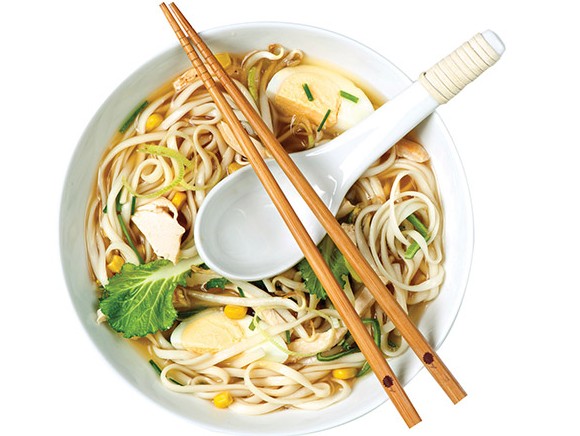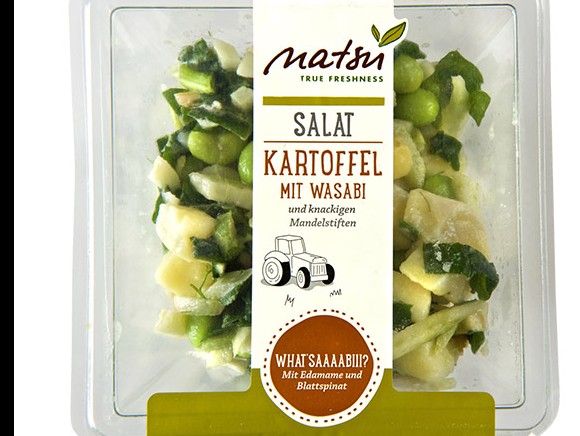
Fresh salads, delicious soups and ready-to-eat meals are packed by Rabbit N.V, a Belgian family business, in a wide range of different trays and formats. All the more reasons to search for a new labeller.
Rabbit was looking for a replacement for the existing MULTIVAC labelling machine, which had been supplied in 2002. “We are constantly expanding our product range, and this means we have to cope with an ever increasing number of different tray formats. But the previous labeller was not designed for our new round trays. A new labelling solution also had to enable us to carry out format changes more quickly and at lower cost,” explains Gert Geysen, Operations Director at Rabbit in the Belgian town of Molenstede. Other requirements: The new labeller had to be integrated into an existing packaging line, and the length of the transport conveyor had to be no more than 1.5 metres.
The products consist of fresh salads, which are assembled at Rabbit to both classic and contemporary recipes, and which include meat, fish, pasta, rice, vegetables, pulses and couscous as well as just the right dressing. There are also delicious soups on the menu, capable of being prepared in less than a minute by adding hot water, and which can then be eaten at home or in the office as a small snack or a main meal. Another product group comprises ready meals of all types, which only need to be heated briefly and can be on the table within three minutes. Rabbit uses only fresh, high-quality ingredients for all its meals, and their composition reflects current trends and consumer preferences. The family business has built up a strong brand over the years, and it is associated in the minds of consumers with taste, quality, innovation and healthy eating. More than ten million meals are produced and packed annually in 24-hour operation. They are delivered to supermarket shelves in Belgium, the Netherlands, France and Germany.
Two MULTIVAC L 310 conveyor belt labellers, which have been in operation since July 2016, are used for top labelling, L-labelling on the top and front and also C-labelling, where the label is applied to the top, over the front and then to the underside. The output of each labeller is 40 to 50 packs per minute. The machine has two types of dispensing edge, which are used depending on the kind of labelling required: in the case of L- and C-labelling, the label is dispensed vertically from above in front of the leading edge of the tray. The tray takes the label with it as far as a sponge rubber press-on roller. This presses the label onto the front of the tray. In the case of C-labelling, the roller then pivots downwards and rolls the label firmly onto the underside of the tray. At the same time, rollers on the top ensure the label is also firmly applied to the top of the tray.
If simple top labelling is required, a dispensing edge with a brush applies the label horizontally to the tray from above. Depending on which of the packaging lines the particular labeller is used in, the running direction and operating side can be set up differently – one time from left to right, the other time from right to left. MULTIVAC: “Thanks to the modular construction of the L 310, we were able to design a very compact model for Rabbit, which met the space requirements and could be ideally adapted both technically and economically to the different products, as well as solving the three labelling tasks,”
So the change between the different trays and labelling for- mats could be carried out quickly and simply as requested, the labeller had to be equipped with as few adjustment units as pos- sible and without dedicated format parts. The L 310 labellers at Rabbit were therefore equipped with height adjustment for the label dispenser (adjustment range 110 mm), so the different tray depths can be run without problems. The label dispenser can also be adjusted sideways, so the label can be positioned precisely on trays with different widths.
A TTO 10 thermal transfer printer is used as the printing system. It can print both labels and film with text, graphics and logos, as well as variable dates, batch numbers, barcodes and 2D codes. Its print resolution is 300 dpi. The labeller and printer are operated and controlled by the HMI 2.0 control terminal. Gert Geysen is particularly impressed by the human-machine interface: “The most significant benefit for us with this labelling solution is actually the very simple operation. The new HMI is really easy to understand, and the handling is very simple and quick. This also applies to the whole labelling system. Whereas with the old label- ling solution we had to laboriously set the height of the transport conveyor for each tray, now we only have to adjust the height of the label dispenser. And thanks to the high-performance thermal transfer printer, we can now apply the required production data precisely to the labels with excellent print quality.”

The labelling results fully meet all expectations. Edge-wrap label- ling offers many benefits: firstly, the sealing label shows the pack is securely sealed and has not been opened at the point of sale. Secondly, the label serves as a closure label, since the lid is securely fastened to the hinged tray. If the packs are stacked, the important information about the product can be easily read on the side label. And last but not least, the product can be attractively presented on the shelf or at the deli counter. Sleeves and sealing labels enhance a pack and are generally perceived by consumers as a sign of particular freshness and traditional manufacture.
Source: © Multivac